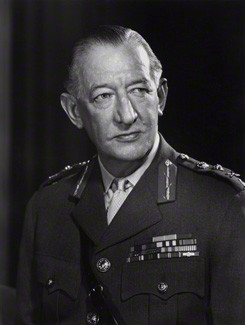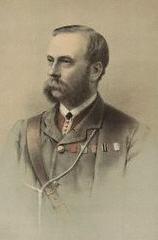
Field Marshal Sir Archibald James Halkett Cassels, was a senior British Army officer who served as Chief of the General Staff (CGS), the professional head of the British Army, from 1965 to 1968. As a young man he was a first-class cricket player, initially playing in India for the Europeans against the Hindus in the Lahore Tournament and going on to play for a Punjab Governor's XI against Northern India team and for a Viceroy's XI against the Roshanara Club. He later played for the British Army cricket team against the RAF at The Oval and then played for the Egyptian national side against HM Martineau's XI in Alexandria.

Sir Timothy John Granville-Chapman, is a former British Army officer, who served as Vice-Chief of the Defence Staff of the British Armed Forces (2005–2009).
Major-General Sir Colin John Mackenzie was a British soldier and Chief of the General Staff, the head of the Canadian Militia, from 1910 until 1913.
Lieutenant-General Sir George Charles Gordon-Lennox was a senior British Army officer who served during the Second World War.

General Sir Charles Whittingham Horsley Douglas, was a British Army officer who served in the Second Anglo-Afghan War, the First Boer War, the Suakin Expedition, the Second Boer War and the First World War. He was Chief of the Imperial General Staff during the first three months of the First World War but died from strain and overwork without having any meaningful influence on the outcome of the war.
Lieutenant General Sir Alistair Stuart Hastings Irwin, is a retired British Army officer and a former Adjutant-General to the Forces.
General Sir Joseph David Frederick Mostyn was a British soldier and one-time Adjutant-General to the Forces.
Lieutenant-General Sir Derek Boileau Lang KCB DSO MC was a senior British Army officer who served in the Second World War and was later General officer commanding-in-Chief (GOC-in-C) of Scottish Command.
Lieutenant General Sir Edwin Otway Herbert, was a senior British Army officer who served during the Second World War and achieved high command in the 1950s.

General Sir Archibald Alison, 2nd Baronet was a Scottish soldier who achieved high office in the British Army in the 1880s. He was a descendant of the Alison family presented by Francis Galton in Hereditary Genius (1869) as an example of genius inherited over several generations.
Lieutenant General Sir Alexander Crawford Simpson Boswell, was a British Army officer. He joined the army as junior officer in the Argyll and Sutherland Highlanders shortly after the Second World War and, following a series of regimental and staff postings, was second-in-command of 1st Battalion the Argyll and Sutherland Highlanders during the Indonesia–Malaysia confrontation. He later commanded the battalion, then 39th Infantry Brigade, before taking command of the 2nd Armoured Division in 1978. He was later the General Officer Commanding in Scotland and Lieutenant Governor of Guernsey before retiring in 1990.
Major-General Mark Jeremy Strudwick was a British Army officer, who served as General Officer Commanding Scotland from 1997 to 2000.
Major General Sir Charles Edward Corkran, was a senior British Army officer who served as Major-General commanding the Brigade of Guards and General Officer Commanding London District from 1928 to 1932.
Major-General Sir Reginald Laurence Scoones, was a British Army officer who served during the Second World War and its aftermath. His older brother was General Sir Geoffry Scoones.

Lieutenant General Sir Andrew John Noble Graham, 5th Baronet, is the Colonel of the Royal Regiment of Scotland and was Director General of the Defence Academy of the United Kingdom.
General Sir Antony Kenneth Frederick Walker, was a British Army officer who served as Commandant of the Royal College of Defence Studies from 1990 to 1992.

General Sir Richard Chambré Hayes Taylor was a senior British Army officer who served in the Second Anglo-Burmese War, the Crimean War and the Indian Mutiny. Joining the General Staff in 1860, he was the British Army's Inspector General of Recruiting, then Deputy Adjutant-General to the Forces, briefly Adjutant-General, and finally for three years Governor of the Royal Military College, Sandhurst. He was also Colonel of the Queen's Own Cameron Highlanders and the East Surrey Regiment.
Major-General Victor David Graham Campbell was a British Army officer of the Second World War and post-war period.
Major General The Honourable Sir Frederick Gordon, was a senior British Army officer, who additionally served as a major general in the early Royal Air Force.

Major-General Sir James Syme Drew was a decorated British Army officer who saw service during both the world wars. He served as aide-de-camp to the King, commanded the 52nd (Lowland) Infantry Division, was colonel to the Queen's Own Cameron Highlanders, and became director-general of the Home Guard and Territorial Army.






